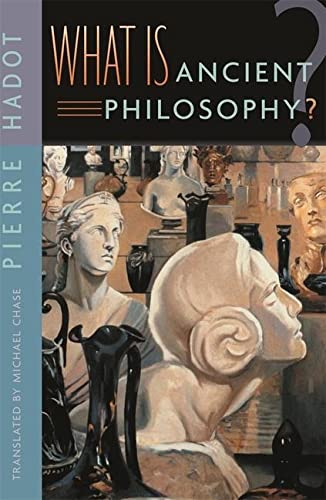Customer Services
Copyright © 2025 Desertcart Holdings Limited


Belknap Press What Is Ancient Philosophy?
E**Y
I agree entirely...
...with the other assessments here. I had picked this up having previously read Hadot's The Inner Citadel: The Meditations of Marcus Aurelius and also having seen this other work of his recommended. To be honest at first, on reading the first section, I thought that this was going to be fairly shallow and not offering much new (especially given my other previous reading on ancient philosophy), but it does begin to pick up. The main theme is about how the ancient schools' philosophies were to be lived out at all times and not merely theorised about or only spoken about in the lecture hall. Modern studies of these schools tend to rather forget this.Hadot writes in plain language and the result is very readable. It's the kind of book I wish I had read long ago, and it should be first item on the reading list for anyone embarking on a study of ancient philosophy or the history of philosophy. The Inner Citadel: The Meditations of Marcus Aurelius
M**H
Life changing
What is Ancient Philosophy? The answer Hadot gives is the title of another of his books: Philosophy as a Way of Life: Spiritual Exercises from Socrates to Foucault . Both books cover the same ground, but complement each other very well, so both are worth reading. "What is Ancient Philosophy?" is a broad overview of the area, while "Philosophy as a Way of Life" focuses on specific topics in greater depth.Hadot stresses the importance of philosophy ("the devoted pursuit of wisdom") as a way of life, not just as an abstract system of thought. His book starts with Plato's Symposium, with Socrates pursuing a discourse and way of life that tends towards wisdom without ever achieving it. For the ancients, the wise person was someone who knew how to live in happiness, and applied that knowledge.The author goes on to consider the schools that followed Socrates in viewing philosophy as a way of life. These include the schools of Antisthenes the Cynic, Epicurus, Plato, Aristotle and Zeno the Stoic. He considers in some depth the spiritual exercises that each school adopted to bring positive changes to the lives of their followers.The adoption, and perversion, of the practices of the Ancient schools by Christianity is briefly considered before Hadot takes on the more fruitful theme of seeing how these practices were taken up by modern philosophers like Montaigne, Descartes, Spinoza, Nietzsche, and Foucault. Finally, Hadot gives the reader some level-headed advice on how he or she can adopt and adapt the exercises to the conditions of modern life.The book is very well written, showing none of the opacity of writing encountered in writers like Derrida or Heidegger. Hadot has been widely acclaimed by leaders in the field, and most of his works can be recommended to the general reader as well as the student of philosophy. I've never read a better book on ancient philosophy, or on philosophy in general. Not only is it a great read, and a work of the highest scholarship, it's life changing. Philosophy as a Way of Life: Spiritual Exercises from Socrates to Foucault
D**S
Five Stars
Readable, sane, profound knowledge worn lightly by a master of his subject.
W**N
Great one-volume summary of Western philosophical tradition
This book provides an excellent summary of the nature, purposes, and evolution of major Greek and Roman philosophical schools and their descendants through the medieval era. As such it is an excellent one-volume introduction to many of the traditions and personalities involved in those schools, and includes tidbits that you will not get from a typical university course. (Did you know that Plato's school included at least a couple of women, one of whom initially snuck in disguised as a man?) A major theme of the work is that the definition of philosophy has changed dramatically in recent centuries. Philosophy is usually now seen as an academic profession devoted to scholarly discussion of selected texts and concepts. In the classical and medieval eras, philosophy was primarily a way of life, which (at least for some schools) might be sought after by people in any walk of life. For those of us who still have an interest in the latter definition, this work is inspiring.
A**I
Highly recommended!
One of the best books on the history of philosophy for people who don’t know anything about the subject. Easy and understandable writing!
Trustpilot
5 days ago
2 weeks ago